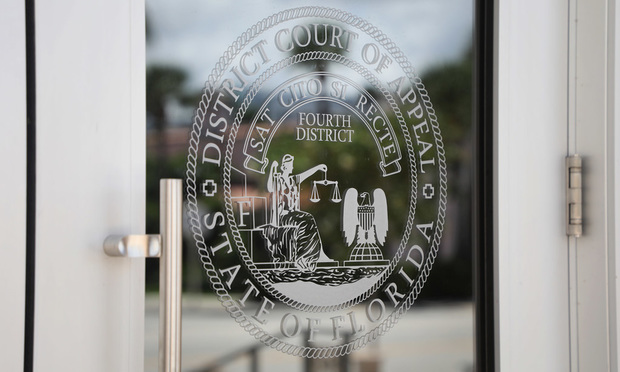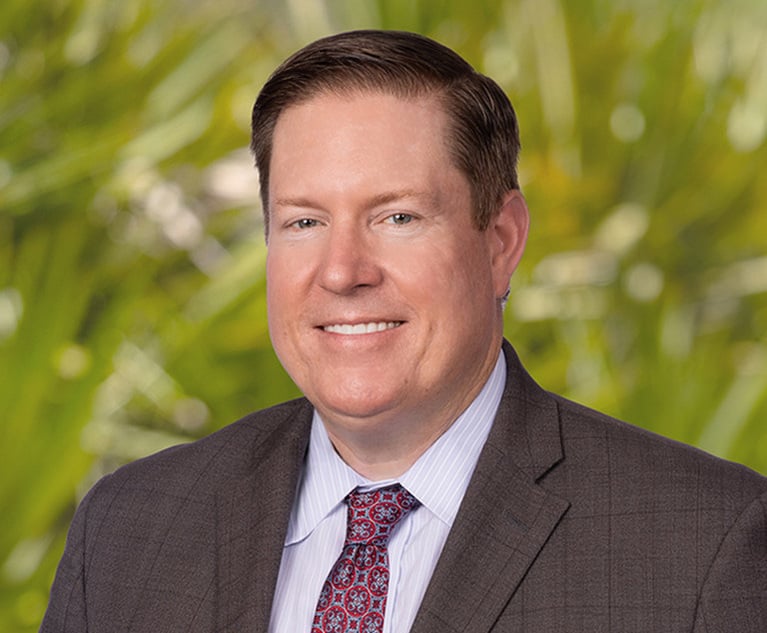Appeals Court Rules Against Environmentalist in 'Malice' Case
The Fourth District Court of Appeal rejected arguments by Maggy Hurchalla, sister of the late U.S. Attorney General Janet Reno, that her communications with Martin County officials were protected by the First Amendment.
June 20, 2019 at 01:14 PM
3 minute read
 The Florida Fourth District Court of Appeal. Photo: J. Albert Diaz/ALM.
The Florida Fourth District Court of Appeal. Photo: J. Albert Diaz/ALM.
In a case watched by environmental and First Amendment groups, a state appeals court upheld a $4.4 million verdict against a prominent South Florida environmentalist who fought a project that included limerock mining.
A three-judge panel of the Fourth District Court of Appeal rejected arguments by Maggy Hurchalla, sister of the late U.S. Attorney General Janet Reno, that her communications with Martin County officials about the project were protected by the First Amendment.
The decision was a victory for property owners Lake Point Phase I, LLC and Lake Point Phase II, LLC, which argued that Hurchalla engaged in “tortious interference” when she worked behind the scenes to thwart the project and undermine an agreement between the county and the South Florida Water Management District. The property owners filed a lawsuit that led to Martin County paying $12 million as part of a settlement and a jury returning a $4.4 million verdict against Hurchalla.
The appeals court focused, in part, on whether Hurchalla's communications with county commissioners were protected by the First Amendment and whether they involved malice. The judges cited a Jan. 4, 2013, email that Hurchalla sent to county commissioners that included a false statement about documented benefits of a stormwater treatment area that would be part of the project.
“These statements are examples of competent substantial evidence that clearly and convincingly proved that Hurchalla demonstrated actual malice in interfering with Lake Point's contracts with the county and the [South Florida Water Management] district, by making statements she either knew were false or with reckless disregard as to whether they were false,” said the 12-page ruling, written by Judge Burton Conner and joined by judges Dorian Damoorgian and Alan Forst. “Hurchalla's comments were represented as statements of fact, as opposed to statements of pure opinion. Even if we viewed the statements as 'mixed opinions,' the statements would not be privileged under the First Amendment.”
The case drew friend-of-the-court briefs on behalf of Hurchalla, a former Martin County commissioner, from a wide range of groups, including the First Amendment Foundation, the League of Women Voters of Florida, the Sierra Club, the Florida Wildlife Federation and Friends of the Everglades. (Disclosure: The News Service of Florida is a member of the First Amendment Foundation.)
In a brief filed last year, Hurchalla's attorneys wrote that the case is a “textbook example of a 'SLAPP' suit — a lawsuit commenced strategically to discourage citizens from exercising their fundamental constitutional rights to speak on matters of public concern and to ask their government officials to redress problems.”
But the property owners' attorneys argued in a brief that Hurchalla worked to “breach” the agreement between the county and water management district.
“Central to this campaign was Ms. Hurchalla's repeated dissemination of information that she either knew was false or had a high degree of awareness of the information's probable falsity,” the brief said. “In her zeal to stop Lake Point, she did not engage in public protest; instead, she secretly poisoned the relationship between the county and Lake Point with false information behind the scenes.”
Jim Saunders reports for the News Service of Florida.
This content has been archived. It is available through our partners, LexisNexis® and Bloomberg Law.
To view this content, please continue to their sites.
Not a Lexis Subscriber?
Subscribe Now
Not a Bloomberg Law Subscriber?
Subscribe Now
NOT FOR REPRINT
© 2025 ALM Global, LLC, All Rights Reserved. Request academic re-use from www.copyright.com. All other uses, submit a request to [email protected]. For more information visit Asset & Logo Licensing.
You Might Like
View All
Mediating Community Association Disputes: Tips for Attorneys, and Their Clients
6 minute read

Cole, Scott & Kissane Keeps Transitioning More Resources Into Construction As Tort Reform Changes Loom
4 minute readTrending Stories
- 1'A Death Sentence for TikTok'?: Litigators and Experts Weigh Impact of Potential Ban on Creators and Data Privacy
- 2Bribery Case Against Former Lt. Gov. Brian Benjamin Is Dropped
- 3‘Extremely Disturbing’: AI Firms Face Class Action by ‘Taskers’ Exposed to Traumatic Content
- 4State Appeals Court Revives BraunHagey Lawsuit Alleging $4.2M Unlawful Wire to China
- 5Invoking Trump, AG Bonta Reminds Lawyers of Duties to Noncitizens in Plea Dealing
Who Got The Work
J. Brugh Lower of Gibbons has entered an appearance for industrial equipment supplier Devco Corporation in a pending trademark infringement lawsuit. The suit, accusing the defendant of selling knock-off Graco products, was filed Dec. 18 in New Jersey District Court by Rivkin Radler on behalf of Graco Inc. and Graco Minnesota. The case, assigned to U.S. District Judge Zahid N. Quraishi, is 3:24-cv-11294, Graco Inc. et al v. Devco Corporation.
Who Got The Work
Rebecca Maller-Stein and Kent A. Yalowitz of Arnold & Porter Kaye Scholer have entered their appearances for Hanaco Venture Capital and its executives, Lior Prosor and David Frankel, in a pending securities lawsuit. The action, filed on Dec. 24 in New York Southern District Court by Zell, Aron & Co. on behalf of Goldeneye Advisors, accuses the defendants of negligently and fraudulently managing the plaintiff's $1 million investment. The case, assigned to U.S. District Judge Vernon S. Broderick, is 1:24-cv-09918, Goldeneye Advisors, LLC v. Hanaco Venture Capital, Ltd. et al.
Who Got The Work
Attorneys from A&O Shearman has stepped in as defense counsel for Toronto-Dominion Bank and other defendants in a pending securities class action. The suit, filed Dec. 11 in New York Southern District Court by Bleichmar Fonti & Auld, accuses the defendants of concealing the bank's 'pervasive' deficiencies in regards to its compliance with the Bank Secrecy Act and the quality of its anti-money laundering controls. The case, assigned to U.S. District Judge Arun Subramanian, is 1:24-cv-09445, Gonzalez v. The Toronto-Dominion Bank et al.
Who Got The Work
Crown Castle International, a Pennsylvania company providing shared communications infrastructure, has turned to Luke D. Wolf of Gordon Rees Scully Mansukhani to fend off a pending breach-of-contract lawsuit. The court action, filed Nov. 25 in Michigan Eastern District Court by Hooper Hathaway PC on behalf of The Town Residences LLC, accuses Crown Castle of failing to transfer approximately $30,000 in utility payments from T-Mobile in breach of a roof-top lease and assignment agreement. The case, assigned to U.S. District Judge Susan K. Declercq, is 2:24-cv-13131, The Town Residences LLC v. T-Mobile US, Inc. et al.
Who Got The Work
Wilfred P. Coronato and Daniel M. Schwartz of McCarter & English have stepped in as defense counsel to Electrolux Home Products Inc. in a pending product liability lawsuit. The court action, filed Nov. 26 in New York Eastern District Court by Poulos Lopiccolo PC and Nagel Rice LLP on behalf of David Stern, alleges that the defendant's refrigerators’ drawers and shelving repeatedly break and fall apart within months after purchase. The case, assigned to U.S. District Judge Joan M. Azrack, is 2:24-cv-08204, Stern v. Electrolux Home Products, Inc.
Featured Firms
Law Offices of Gary Martin Hays & Associates, P.C.
(470) 294-1674
Law Offices of Mark E. Salomone
(857) 444-6468
Smith & Hassler
(713) 739-1250







